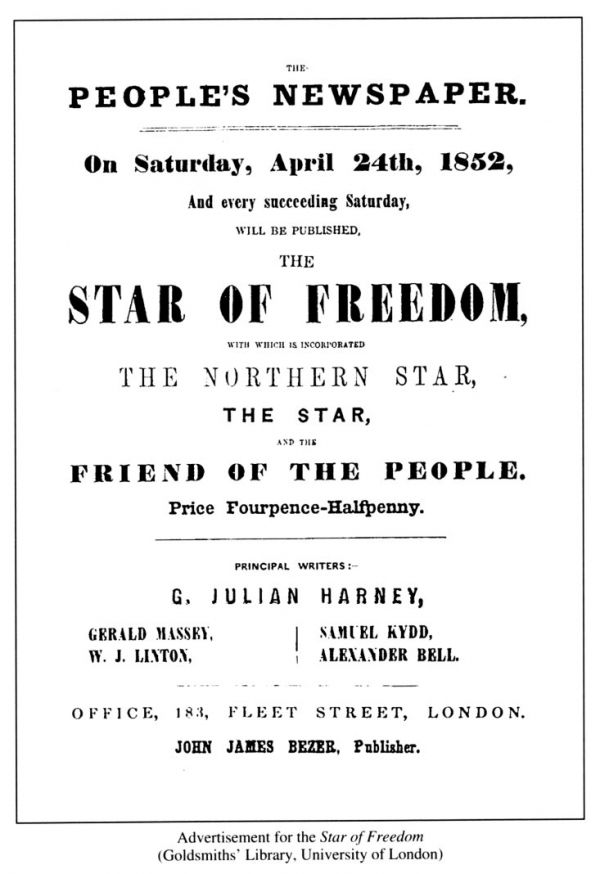Making Better Rhymes: Chartist Poetry and Working Class Struggle

In the first of a series of articles on Chartist poetry and working class struggle, Dr. Mike Sanders traces the background to its development.
Andy Croft in 'The Privatisation of Poetry' cites approvingly, Francis Combes's declaration that "Poetry belongs to everyone". As an aspiration, I couldn't agree more. In reality, the conditional seems more accurate - "Poetry ought to belong to everyone." Andy also suggests, correctly in my view, that poetry ought to be thought of in terms of common ownership. This set me thinking - can poetry be taken into public, or common, ownership? Should we be agitating for the nationalisation of the iambic pentameter?
At first sight, this might seem like a ridiculous question. However, given that poetry has effectively been 'privatised' for a number of centuries, perhaps the question is not so far-fetched. Indeed, the world's first working-class movement - Chartism - devoted a great deal of energy in its attempts to restore poetry to its proper status as the common property of all. In pursuit of this aim Chartist newspapers and journals printed articles such as 'The Politics of Poets' which ran for ten weeks in the Scottish Chartist Circular. This series explicitly sought to reclaim what we would now call 'elite' or 'canonical' poetry for the working-classes. Even more significantly, Chartist newspapers actively supported working-class poets by regularly publishing their poetry. The leading Chartist newspaper, the Northern Star, published almost 1,500 poems from at least 390 Chartist poets between 1838 and 1852.
The Northern Star's poetry column was not an attempt to impose ‘culture’ from above, rather it was a response to a popular demand that poetry could and should speak to working-class desires and needs. From the start, literally hundreds of Chartists sent in their poems and quite a few appear to have pestered the editor with enquiries as to when their work would appear. Occasionally, the editor lost patience with his correspondents. In March 1838 he wrote “We have received as much poetry as a donkey could draw; we shall select from it as occasion offers, so let none be jealous, or we will take it by lot”! Poets sending their poetry had to have a fairly thick skin as the editor could be brutal. ‘W.M.’ (a weaver) sent in a poem and gave the editor permission to make any alterations needed. The editor replied “The best thing we can suggest to him is, to alter all the words, or, what might be still better, take them all away, and leave the paper blank.”
Given the risk of such withering criticism what made so many Chartists put pen to paper to produce poetry? Some wrote to promote solidarity, others to celebrate or commemorate leaders and events. Some wrote to rouse their comrades to action, others to reflect on the aims, aspirations, tactics and strategy of the Chartist movement. We are used to this kind of ‘political poetry’ and I have no wish to deny its importance. However, for many Chartists the simple fact of writing poetry (irrespective of its content) was itself a political action. Composing poetry was an affirmation of working-class creativity in the face of the dehumanising grind of industrial capitalism – a reminder that the ‘hands’ who worked the machines themselves possessed hands capable of producing beauty as well as profit.
One example of this is a poem from a woman who signed herself ‘E.H., a Factory Girl of Stalybridge’. Technically speaking E.H.'s poem is not a good one, as she herself acknowledges. Yet for all its technical deficiencies it is, I feel, a particularly moving poem. E.H. dedicates her poem to the factory reformer, Joseph Rayner Stephens, and she compares her position as a ‘factory girl’ with that of the millowners’ wives and children:
Their children, too, to school must be sent,
Till all kinds of learning and music have learnt;
Their wives must have veils, silks dresses, and cloaks,
And some who support them can’t get linsey coats
E.H. not only points out that their advantages are bought at the cost of her class’s impoverishment, she also protests against her cultural as well as her material deprivation:
If they had sent us to school, better rhyme we could make
I think it is time we had some of their cake.
[...]
We factory lasses have but little time,
So I hope you will pardon my bad written rhyme.
God bless him for striving to get us our rights,
And I wish the world over were true Stephenites.
A Stephenite I am from the ground of my heart,
And I hope from the same I shall never depart.
May God spare your life till the tyrants are ended,
So I bid you good bye, till my verses I’ve mended.
E.H. tells us that her poem is not a ‘good’ one, and traces its limitations to her limited education, which is in turn a product of her class position. E.H. wants better – better working conditions, better education, and the chance to write better poetry which she connects imaginatively with cake, that is with something more than the fundamental necessities of life. 'Culture' is the name we give to that desire for something better and, in future articles, I intend to explore some of the ways in which the role of poetry within the Chartist movement can illuminate many of the current challenges facing the working-class movement.
NB: Readers interested in reading all of E.H.'s poem will find it in the Northern Star for May 18th, 1839. The digitised version of the Northern Star can be found at the following website: http://www.ncse.ac.uk/index.html

Mike Sanders
Mike Sanders is Senior Lecturer in Nineteenth-Century Writing at the University of Manchester.